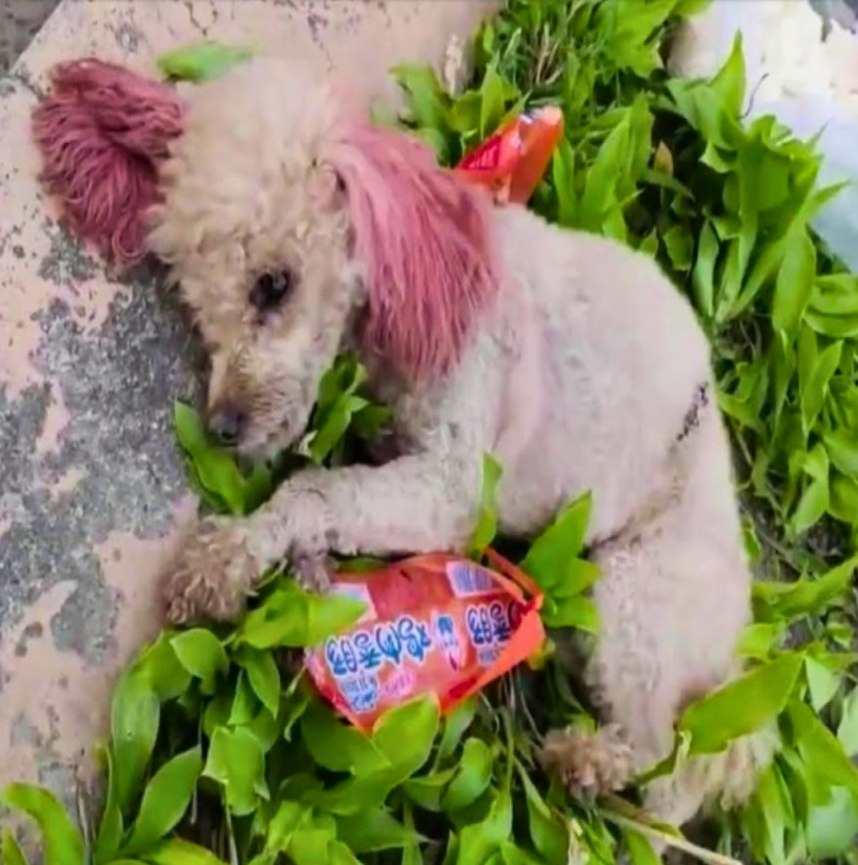Late one evening, as the last rays of daylight faded from the sky and silence began to settle over the small animal rescue camp run by Li Liu, a voice came over the loudspeaker. It was an announcement that stirred everyone’s attention—urgent and filled with hope. Someone was being asked to come quickly to the south entrance to reclaim a lost dog. The message echoed through the camp, cutting through the fatigue of a long day. There was a sense of tension in the air, a blend of concern and anticipation. But amid this heightened atmosphere, Dr. Song, the veterinarian overseeing operations, remained composed.

“The older dog is finally resting,” Dr. Song observed softly as he gently monitored the animal beside him. The dog, aged and clearly in distress, had finally fallen asleep, its breathing now calm and steady. Dr. Song leaned in to examine the dog more closely, noting a serious injury to the ear. He spoke quietly to a nearby assistant, “This leg was trembling earlier; he’s doing much better now that he’s asleep.” Though the animal’s wounds were severe, its calm demeanor gave Dr. Song a moment of much-needed relief. It was small, but in the world of animal rescue, such moments matter deeply.
It had already been a demanding night at the rescue center, but the urgency escalated when, at precisely 9:41 PM, a call came in from Harbin—an alert from Nanjing Road detailing an emergency. A dog had been struck by a car in the Hulan district. Dr. Song sprang into action. “I’m currently in the community shown here on the screen,” he explained as he rushed to the location, “waiting for the witness to arrive.” The situation was critical, and every minute counted.
Not long after, a witness approached him, eyes filled with worry. “Is this the dog?” Dr. Song asked, gesturing toward the injured animal that had just been located near the community entrance. The witness nodded solemnly. “Yes, that’s the one. They left it at the front gate.”
The witness recounted the troubling scene from earlier that day. “During the afternoon, I saw it lying there. Its legs were moving nonstop, almost like it was trying to run but couldn’t. It looked like it was struggling or in a lot of pain.” Dr. Song, wanting to understand the dog’s full condition, asked gently, “Did it eat anything at all today?”
The witness shook their head slowly, eyes cast downward. “No… it hasn’t eaten. And it hasn’t had a single drop of water either.” There was a heaviness to their voice, one that reflected the sorrow and helplessness that so often accompanied such situations. The dog’s condition was clearly deteriorating, and time was slipping away.
Without a moment’s delay, Dr. Song put together a treatment plan. It was clear the dog needed immediate medical attention. “First, we’ll focus on managing the pain to make him more comfortable,” he explained, remaining calm under pressure. “Then, we’ll treat the internal bleeding with appropriate medication and begin nutritional support to rebuild his strength.” Every decision was made with precision and compassion. As he administered the treatments—injecting medication, cleaning wounds, bandaging injured areas—his hands moved with a practiced calm, his mind focused only on giving the dog a fighting chance.
Despite the pain and trauma, the dog remained surprisingly still and compliant. There was no panic, no resistance—just quiet acceptance. Dr. Song noticed this and allowed himself to hope. “Maybe,” he thought, “he knows we’re here to help. Maybe he hasn’t given up yet.” It was a powerful moment, one that reaffirmed why he had chosen this path. In rescue work, success is never guaranteed, but the belief in the possibility of healing never fades.
As the treatment continued into the night, Dr. Song turned to those around him. “Thank you all,” he said with genuine gratitude in his voice. “Please help spread the word. Someone might recognize him—he could still have a family out there.” In addition to healing the body, Dr. Song hoped to heal the spirit, not just of the dog, but perhaps of an owner who had lost him. Every rescue carried with it the potential for reunion, redemption, and hope.
Looking ahead, Dr. Song shared the next steps in the dog’s recovery journey. “We’re getting ready to operate on the ribs,” he explained, referring to the internal damage caused by the accident. It would be a delicate procedure, but necessary to ensure the dog had a real shot at survival and long-term recovery. For now, the team would do everything in their power to stabilize him and prepare for surgery.
Weeks later, the story of the dog—now affectionately named Teddy—took a heartwarming turn. Against the odds, Teddy pulled through. The surgeries were successful, the infections were treated, and his strength gradually returned. Dr. Song, beaming with pride, announced that Teddy had officially been discharged from the animal hospital. He had found a temporary home at the rescue camp, where he continued to heal and adjust to his new life.
It was a small victory, but a meaningful one. In a world where not every story ends with a happy ending, Teddy’s journey offered a moment of joy, a reminder of the importance of compassion, and the impact that swift, determined care can have on a life that many would have given up on. Rescue work is rarely easy—it is exhausting, emotionally taxing, and often heartbreaking—but in moments like this, when a life is saved and a soul is restored, it all feels worthwhile.
Dr. Song reflected on the long road behind them and the one still ahead. But for now, there was gratitude—for the helpers who responded to the call, for the witness who cared enough to speak up, and for the resilience of a dog who refused to give up. Teddy’s recovery served as a symbol of hope and the undeniable power of kindness.





